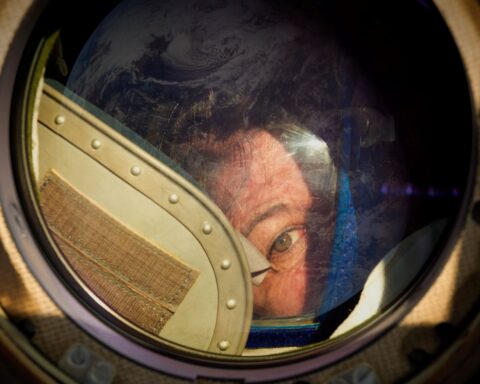The Raft
(Denmark/Sweden/USA, 97 min.)
Dir. Marcus Lindeen
Would the world be a better place if we just put all the men on a raft and sent them off to sea? Maybe, although The Raft makes a fair case that sending certain men seaward might afford them some necessary perspective. This unique documentary by Marcus Lindeen, which won the top prize at CPH:DOX earlier this year, offers a fascinating study in the dynamics of power and control, particularly as they pertain to gender. The film reflects upon a controversial 1973 experiment by Spanish-Mexican anthropologist Santiago Genovés in which five men and six women set sail for 100 days on a ramshackle raft called the Acali. The film tells how the well-intentioned researcher hoped to observe mankind’s dark inclination for violence as the group ventured across the Atlantic Ocean. The project, dubbed “The Sex Raft” by the press, didn’t go quite as Genovés hoped, yet The Raft shows that the experiment may teach audiences profound aspects of humanity.
The premise is ripe for reality television and Lindeen situates the Acali project within the formula of shows like Big Brother. He reassembles the surviving members of the experiment—six women and one man—to reflect upon this radical project. The set-up for the documentary is that the Guinea pigs return to the scene of the crime as Lindeen stages a cathartic reunion on a scale replica of the Acali, built with minimalist rigour by production designer Simone Grau Roney, where the survivors share their experiences for the first time.
The participants are Maria, the Swedish captain tapped to helm the Acali when women in charge were rarities; Edna, the Israeli doctor; Servane, the French diver; Rachida, the beauty; Fé, the lone African-American woman; Mary, an American escaping an abusive relationship; and male Eisuke, a Japanese photographer. Genovés is dead, although he is omnipresent in the documentary thanks to his meticulous notes and archival footage. Actor Daniel Giménez Cacho resurrects Genovés by reading his research and diaries in voiceover, thus providing an additional—and essential—voice to the retrospective.
The voiceover narration introduces the project within the framework that Genovés had in mind. He explains how women were placed in authoritative roles with men fulfilling the less essential duties. Much of Genovés’ effort was to provoke tension, violence, and jealousy by encouraging the participants to have sex with one another. As the film progresses, his diary entries, along with the archival footage and new interviews with participants, reveal how Genovés sought to sow dissension within the ranks at every turn. He told his Guinea pigs that the Acali hoped to cure world peace, when in reality he was lobbing as much meat at sharks in hopes of inspiring a frenzy that would validate his pessimistic worldview.
Lindeen invites the participants to reflect upon the Acali experiment in a variety of situations. There are some direct address one-on-one interviews, while most of their testimony comes via candid conversations between fellow passengers. Sometimes they’re all together but Lindeen often splits them into smaller groups.
There is, however, a randomness to the weight Lindeen affords each participant. Rachida and Servane barely appear outside the discussion containing the full group, while Eisuke doesn’t even seem to be present for much of the reunion. That imbalance leaves Maria, Fé, and Mary to do the majority of the talking. Their observations and conclusions are extremely enlightening, particularly in terms of Genovés’ unconscious racism (he kept nudging Fé to have sex with Bernardo, the lone Black male on board) and his chauvinism (evidenced by the power struggle for authority with Maria).
However, many of the project’s participants simply aren’t present to speak for themselves. There are inevitable gaps in Lindeen’s survey that leave the project lacking, particularly when it comes to the group dynamics on the original raft. The absence of the male perspectives makes the discussion of the raft’s gendered undercurrents rather unsatisfying, since Eisuke’s only comment on the matter is that he wishes he and Maria had slept together more than once. There’s no easy way to contribute the voices of deceased participants, especially since most of them seemed to have left the project behind them after returning ashore, but Lindeen’s approach is more speculative than scientific.
The women’s perspectives are nevertheless illuminating when it comes to the Acali’s inadvertent conclusion on power dynamics. The Raft charts the Acali’s tumultuous journey with great narrative twists and tonal shifts as the women recall how they weathered Hurricane Santiago. While the film film shows that the Acali experiment failed to prove Genové’ hypothesis that social norms would break down at sea and send the participants into chaos, thus proving humankind’s innate darkness, Lindeen’s film portrays the project as a successful reminder that people are innately good. The participants agree that the project elicited from Genovés produced the very toxic behaviour he hoped to observe in them, but they recognized the faults in his leadership and became stronger as a group. Perhaps a utopian ideal is possible if a random sampling of the world’s citizens is inclined to create harmony. Society just needs the right captain to steer the ship.
The Raft is the November selection for Hot Docs Cinema’s Doc Soup series.
It screens on November 6 and 7.










